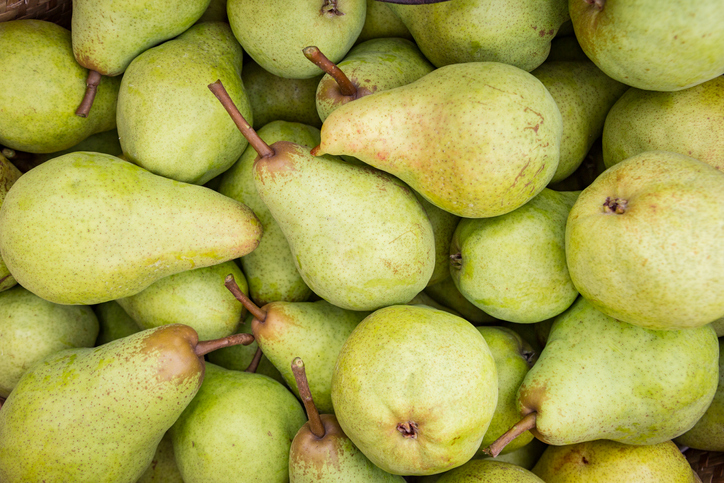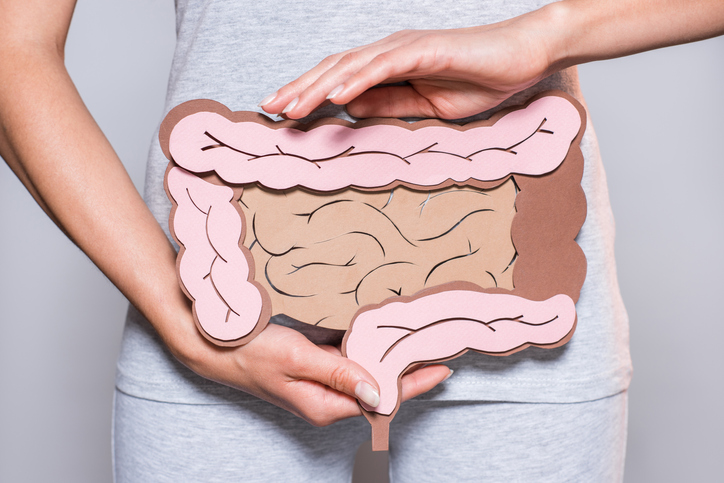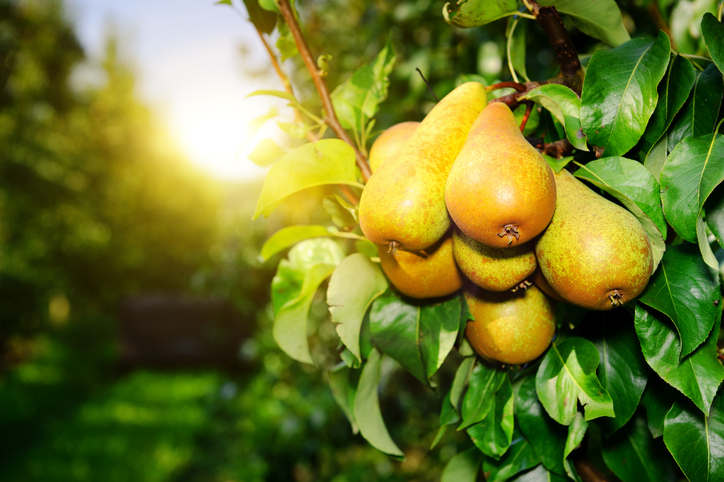Pears are a common fruit; they’re usually sweet and shaped like a bell. They also come in a variety of textures and colors, though the health benefits of all types are similar. We can enjoy crispy pears, soft pears, green pears, and even pink ones.
When you slice a pear open, the flesh looks similar to that of apples. The flavor is different, though still delicious. You can eat a pear like you would eat apples, but it can also be cut up and mixed into salads, used in smoothies, or even candied to make a sugary treat.
As long as we leave the sugar out of it, though, pears can be a very beneficial and healthy snack or part of a well-balanced meal. Let’s have a look at some of these benefits now:
1. A Lot of Nutrients

While the d’Anjou pears are very popular, pears are available in several vanities. These include the Bosc and Bartlett types, but around a hundred more kinds can be found all over the world. No matter what type we choose, a medium-sized specimen can give us a nice boost of nutrients.
We get around 101 calories from an average pear, along with one gram of protein. There are 27 carbs in one medium pear, so it’s probably not the best choice for someone who’s just starting the ketogenic diet (you’re only allowed around 20 carbs per day with that lifestyle).
Additionally, we get around 6 grams of fiber and 12 percent of the RDI of Vitamin C. Vitamin K, copper, and potassium are also present here, along with niacin, provitamin A, and folate in small quantities. These nutrients are instrumental in boosting cellular function, increasing energy levels, supporting skin health, and healing wounds.
These nutrients are also available in a lot of drupes, so we might want to add those fruits to our daily diets as well. With this precaution, we should be seeing a stronger immune system, better heart function, and a naturally glowing complexion.
2. Polyphenol Antioxidants

We get a large number of polyphenol antioxidants with this fruit as well, which are useful for protecting our bodies from oxidative damage. In order to get these polyphenols, however, we should eat the pear including the peel. The latter contains a high level of polyphenol antioxidants, around six times more than the pear’s flesh.
3. Bettering Gut Health

Our gut is a major player in our overall health. If we don’t have enough good bacteria in there, the body will suffer from digestive issues and more. With pears, we get a lot of insoluble and soluble fiber, both of which are important to ensure a healthy digestive system. With such fibers, we can be assured of bowel regularity at the very least.
Soluble fibers are especially useful here, as they contribute to the healthy bacteria within our gut. They’re also considered to be prebiotics, leading to better immunity and graceful aging.
Plus, fiber helps in preventing and relieving painful issues like constipation. In one study, it was found that consuming a certain amount of pectin or fruit fiber resulted in relief from constipation and the production of more beneficial bacteria in the gut.
4. Useful Plant Compounds

The many hues of pears–brown, pink, green, yellow–signal the many plant compounds inside them. These compounds can be very beneficial for our overall health.
If your pear has a pinkish or reddish tinge, this means that there are anthocyanins inside it. This is a compound that could lead to better heart health and stronger blood vessels. While there’s a lack of specific research on pears in this regard, anthocyanins are known to reduce the risk of getting heart diseases. This is why heart patients are advised to consume berries and other foods that have this compound.
5. Promoting Eye Health

Green pears have zeaxanthin and lutein inside, which are two compounds that help to keep our vision clear and sharp. This will be especially beneficial for people with a family history of declining vision due to age.
Again, though, it’s necessary to consume the pear’s skin in order to gain such benefits in their entirety. As long as we make sure to eat the peel, we can be more confident of the fruit improving our health and body functions.
6. Fights Inflammation

Inflammation is a sort of immune response. It’s normal in some canvases, but the long-term or chronic kinds can be very harmful to our health. With inflamed body cells, our major organs might be put under pressure. Even the heart might be adversely affected, leading to heart disease. Contracting Type 2 diabetes is also a very real threat when we have body cell inflammation.
Fortunately, pears have a lot of flavonoids, which are antioxidants that soothe inflammation. This action could decrease our chances of contracting both diabetes and heart disease.
There have been many reviews that link a decent consumption of flavonoids to lower occurrences of serious diseases. These compounds have antioxidant and anti-inflammatory properties, so we would do well to consume more of them. Pears can help us reach this goal as well as other healthy options like bananas, peaches, etc. Along with these flavonoids, pears also give us minerals and vitamins like copper, Vitamin C, and Vitamin K, all of which fight against inflammation.
7. Possible Anticancer Effects

Pears also have some compounds that might contain anti-cancer properties. Some examples of these compounds include cinnamic acid, anthocyanin, etc. Studies have shown that these substances can fight cancer and prevent it from taking a firm hold in the body.
Some studies also suggest that consuming a lot of fruits on a regular basis could actually help to protect our body from a variety of cancers. The bladder, lungs, and stomach were specially protected with this precaution. Fruit that’s rich in flavonoids is also known to guard women against ovarian and breast cancer, so females should be ready to include pears and other healthy options in their diets.
8. Possibly Preventing Diabetes

Incidentally, the red strains of pairs might help to lower the risk of contracting diabetes. This could be surprising to some, as pears and fruits, in general, are recommended only in moderation for diabetics.
However, there has been a large study regarding fruits that are rich in anthocyanins. Consuming five or more servings of such fruits might decrease our chances of contracting Type 2 diabetes by around 23 percent.
FAQ- Why We Should Eat More Pears
1. Can we eat two pears every day?
Yes, you can eat two pears every day. Pears are extremely beneficial to our health because they pack within themselves so many nutrients that one should definitely not sideline them.
A medium-sized pear contains about 6 grams of fiber. These 6 gram make up 21 percent of our daily fiber requirement. Hence, if you were to consume two pears every day, you would have eaten half of your daily fiber requirement. Additionally, pears also contain vitamin C which is extremely beneficial to us and helps boost our immunity and protect us from various kinds of diseases. According to the Dietary Guidelines for Americans, eating two pears every day meets our fruit requirements for the day as well.
Hence eating two pears a day is not only acceptable but also encouraged.
2. Are pears good for gut health?
Yes, pears are great for gut health because they contain fiber. Fiber is an essential part of our diet, and other than keeping us safe from cardiovascular diseases and cancers, it also ensures that our gut and bowel movements are regular.
The fiber that is found mostly in pears is in the form of pectin. Pectin has been proven to reduce blood cholesterol levels. Since cholesterol has a big hand in causing heart diseases, lowering cholesterol levels means that you are at a lower risk of developing heart diseases.
Among the three kinds of fibers that we consume, pears are rich in pre-biotic fiber as well. This kind of fiber helps promote intestinal health. Probiotic fiber does this by providing our body with beneficial probiotic bacteria.
3. Can pears be eaten at night?
Yes, contrary to popular belief, most fruits can be eaten at any time of the day. Since pears are mainly carbohydrate-based food, one might think that they should not be consumed at night. However, if they fit your daily caloric goals, then you can eat pears whenever you want.
Additionally, if you want to lose weight, pears can be a great late-night or before-bed snack. This is because pears have high fiber content and fiber is great for those who are looking to lose weight. Additionally, it also aids in gut health so if you have constipation, that too can be resolved via fiber that is found in pears.
4. Do pears have any side effects?
Most natural foods do not have any side effects however, if you consume anything in excess, you will feel the effects later on. Pears are a great source of dietary fiber as a medium-sized pear contains 6 grams of dietary fiber. However, if you consume too many pears, you are at a risk for overeating fibers. Too much fiber is not good at all and can cause many issues. You can face digestive issues as well as problems with vitamin absorption in your body.
Additionally, pears also contain a large amount of vitamin C. Thus, if you consume too many pears, your body will have excess vitamin C which can lead to several complications. Excess of vitamin C can cause nausea, heartburn, headaches, bloating, and even diarrhea. Hence, you should stick with 2 pears or less a day.
5. What is the best time to eat pears?
Naturally occurring foods like fruits rarely have any side effects and are so nutritious that they can be eaten at any time of the day. Just because they can be eaten whenever you want doesn’t mean that there aren’t any benefits associated with eating them at a certain time.
We feel that having a pear every morning along with your breakfast is the best time to avail all the benefits that come with eating pears. They not only help you slim down, but they also help in helping you stay full for longer. Because pears have a substantial amount of fiber, they can help prevent you from mindlessly snacking and eating more calories than necessary.
Conclusion
While eating a certain amount of fruit is certainly healthy and could reduce our risk of many diseases, we should always strike a balance. Too much fruit can result in unhealthy spikes in our blood sugar, so we should check out how many servings are recommended on a daily or weekly basis. Fruit is a delicious and healthy addition to our menu for almost every meal, but they’re not a replacement for any sort of medical treatment. Stock up on some today and get started on those healthy eating habits.

